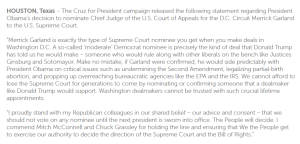“You know, I think there will be plenty of time for debate on that issue,” the Texas Republican told reporters gathered after a speech in Colorado, according to The Washington Post. “There is certainly long historical precedent for a Supreme Court with fewer justices. I would note, just recently, that Justice (Stephen) Breyer observed that the vacancy is not impacting the ability of the court to do its job. That’s a debate that we are going to have.”
Cruz’ comments contradict his own statement after President Obama nominated Merrick Garland to fill Scalia’s seat. In March, Cruz’ campaign released a statement that “I proudly stand with my Republican colleagues in our shared belief – our advice and consent – that we should not vote on any nominee until the next president is sworn into office. The People will decide.”

So far, Senate Republicans have refused to hold hearings for President Barack Obama’s nominee, Merrick Garland, following Scalia’s unexpected death last February.
Cruz’s comments show his willingness to hold open the vacancy in the event Democrat Hillary Clinton emerges victorious on Election Day. Clinton has not indicated whether she plans to renominate Garland or make a different appointment if she wins the White House.
Sen. Jeff Flake, R-Arizona, said he strongly disagrees with the idea that a GOP-controlled Senate could block a Supreme Court nomination from a President Clinton for up to four years and said he doesn’t think there will be wide support for the idea among Senate Republicans.
“You will not be surprised, I do not agree. There is a difference between what might be constitutional and what you can do politically… I think leaving a vacancy for up to for years is not why we are here,” said Flake, a member of the Judiciary Committee, which would hold hearings on any nominee.
“I think there are enough people who do not see it as the Senate’s proper role to hold somebody indefinitely,” he said.
Flake said he spoke recently to Republican Leader Mitch McConnell to get “on-the-record” that he would oppose such an approach and that he didn’t “detect” any interest from McConnell in such a blockade.
Impact of eight-member court
Cruz is the latest member of Congress to suggest that the Senate does not need to fill the open seat.
“In a narrow sense, Cruz is correct about historical precedent; when the Supreme Court was created in 1789, it had six justices — one for each of the geographic courts of appeals — and only added seats as territorial expansion led to the creation of new courts of appeals throughout the 19th century,” said Steve Vladeck, a CNN legal contributor and professor at the University of Texas Law School.
The size of the court has been fixed at nine justices since 1869 — including through the constitutional crisis President Franklin D. Roosevelt provoked in 1937 with his proposed “court-packing” plan that would have added six new seats, all of which he would have been able to fill with nominees who would vote to uphold his policies.
“Thus, the ‘long historical precedent’ Cruz invoked is, in fact, outdated and anachronistic,” Vladeck said. “Historically, when Congress has been concerned that particular seats on the Supreme Court should not be filled, it has eliminated the seats — as it did on three occasions in the 1860s. Calling for the Senate to simply leave a seat on the Court open in perpetuity is, in fact, unprecedented.”
Having an evenly divided Court for the past eight months has created a number of headaches for justices. When the justices deadlock 4-4, it has the result of leaving the lower-court decision, which may have upheld or struck down the law in question, intact. Especially when lower courts are split on an important legal question, such as the availability of religious exceptions to Obamacare’s “contraceptive mandate,” an evenly divided court is unable to resolve the dispute, which could result in different understandings of federal law in different parts of the country.
Monday, when the Supreme Court released its oral argument calendar for December, court watchers immediately noticed that the calendar, which had a number of unfilled slots, was missing three high-profile cases long-since ready for argument — cases that the justices are apparently waiting to schedule until there is a ninth justice, Vladeck noted.
Justices speak out
Supreme Court justices have generally avoided the politics of leaving Scalia’s seat vacant and have tried to emphasize that the court is working with only eight justices, as Breyer noted.
But that doesn’t mean justices don’t want a full bench.
Justices Sonia Sotomayor and Ruth Bader Ginsburg spoke to PBS’ Charlie Rose Wednesday night and addressed the issue.
“I think we did remarkably well last term when there were only three decisions… three cases that couldn’t be decided because there was an even decision. They were important cases. And it means uncertainty will continue until there are nine,” Ginsburg said.
“I hope there will nine as quickly as possible. We function as nine,” Sotomayor said.
The Senate must approve Supreme Court nominations.
Cruz, a former rival of Trump in the Republican presidential primary race, withheld his endorsement of his party’s standard-bearer at the Republican National Convention. He’s since said he supports the real estate mogul, citing what he sees as Trump’s commitment to appointing conservative court justices.
CNN’s Colin McCullough contributed to this report.



